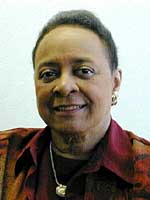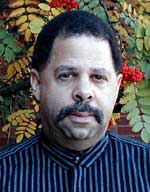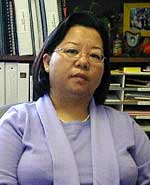By Art Hughes
Minnesota Public Radio
November 19, 2001
|
| RealAudio |
A survey of more than 800 city and county-level elected officials in the Twin Cities metropolitan area shows the number of racial minorities in elected office lags far behind the growth of minority populations. The survey shows minorities are having little success in translating their gains in numbers to power at the polls.
| |
|
|
|
||
New asphalt is a common sight in Eden Prairie, a suburban city southwest of Minneapolis. Roads here are typically designed with curves and landscaping that urban planning studies deem aesthetically pleasing. They lead to cul de sacs lined with $500,000 homes or one of the many low-slung business campuses with "new economy" names like Biomec, ADC Broadband or Convergent Communications.
As in most of Minnesota, the voting-age population of Eden Prairie is predominantly white - more than 90 percent. But Eden Prairie claims a rare distinction in the state - an African-American who holds the top elected office. Jean Harris has been mayor since 1994. She served two terms on the city council before that. Harris says she has doesn't make race an issue.
"You continue to highlight your commonalities rather than your differences," says Harris. "You acknowledge your differences, you address them. You don't try to hide them, but they're not paramount. I don't carry a big plank on my shoulder."
Harris ran unopposed for office shortly after two teenagers were charged with burning a cross in the yard of a black Eden Prairie family. It was also during this time that a high school broomball team wondered why people were making a fuss over the team's choice of a name - the Lynch Mob.
Harris says she is a visible - but not aggressive - representative for her race.
"We may acknowledge that you may have less pigment than I do. But you and I share certain common value structures, and you and I acknowledge that as people - as human beings -we have responsibilities for and to each other," Harris says.
Minnesota Public Radio surveyed more than 150 city and county governments in the metro area. It found Harris is one of only 10 minorities who hold elected office, out of more than 840 elected officials. That's slightly more than one percent. Statewide, minorities and people of more than one race make up 12 percent of the population.
Places like Brooklyn Park, Richfield, Little Canada and Hopkins have seen the proportion of minorities old enough to vote more than double since 1990. Yet local elected representation remains exclusively white in those areas.
| |
|
|
|
||
St. Paul City Councilman Jerry Blakey says it's not necessary for minorities to represent a minority constituency.
"It's more experience. And it's more about fairness and objectivity than your color. Having a background of being a person of color sure might help out in some cases," Blakey says. "But a lot of it is common sense and sense of fair play. I think that's more important than skin color."
Still, Blakey, an African-American who represents the city's ethnically diverse 1st Ward, says having minorities in positions of power is an important ingredient for a healthy society. He says issues like racial profiling would not take hold otherwise.
"If you've been unfairly targeted for not getting a promotion in corporate America, which in some cases has happened to me. There are things inside - you can't explain how that hurts you because you know you have the skill and the talent. But you can't prove that maybe it's an issue of race," says Blakey. "So some of those things are issues of fairness. Perhaps a person from the majority culture might not appreciate or be sensitive to it."
Blakey says established political parties don't want to support minority candidates if they have little chance of winning. But he says if they don't run, they don't gain an understanding of the process.
The title of first black mayor elected in Minnesota goes to Craig Morris of Lakeland, on the St. Croix River. Morris was first elected in 1985 and still holds the office. Shortly after he first won, an angry citizen called and admonished the city clerk, asking how Lakeland could have allowed a black man into office. Morris says he doesn't allow such prejudice to turn into bitterness.
"A sort of interesting paradox for me is - that characteristic may cause some people to pay more attention to what I do and how I do it," Morris says. "That's a motivator for me. I want to work harder, I want to do a better job. I want to dispel myths. And so that actually helps me to do a better job than I might otherwise do."
| |
|
|
|
||
A mere three percent of Lakeland residents over voting age are minorities.
The low numbers of minority elected officials suggest white voters are reluctant to cast ballots for non-whites. At the same time, minority candidates say they can't always rely on minority voters.
The Hmong population in Minnesota has more than doubled in the past 10 years. Most live in St. Paul. In 1991 Choua Lee was elected to the St. Paul School Board. Lee, then 23, became the first Hmong-American elected to office in the nation. Even though she got the most votes in the election, including those in predominantly Asian precincts, Lee says she didn't take the support of other Hmong for granted.
"On top of your regular Hmong politics you have the gender issues and the age issues. Especially it's true for me," Lee says "So I would say my hardest critics would be the Hmong community. You do have to pass a very strenuous standard of what they perceive to be that you can do a good job representing them."
Voters elected another Hmong-American to the school board after Lee left. Several Hmong-Americans have run for other offices since, but lost. One expert says it may be easier for minority candidates in areas where minorities are less prominent. University of Minnesota law professor john powell, the director of the Institute on Race and Poverty, says studies indicate an inverse relationship between minority candidates and minority populations.
"In a city or town where you have 1 percent minority you might get 3 percent of minorities elected there. But when the populations go up to 15 percent, the numbers (of minorities elected) actually go down," powell says. "And continues to stay depressed until you get about 42 percent minorities, then once again you get minorities elected more consistent with their proportion to the population."
The accepted theory goes like this - the white majority doesn't consider minorities a threat until they reach a certain visible number, at which time whites begin to withdraw support from minority candidates. The minority voting block doesn't carry any political weight until the population becomes a force of its own, and can direct an election without relying on white voters.
| |
|
|
|
||
The MPR survey of elected officials was taken before the November 6 election. Since then Minneapolis Mayor Sharon Sayles Belton, an African-American, lost her seat to a white man. Sayles Belton won only those parts of the city with large black populations. Still, observers say her loss has more to do with the two-term veteran being seen as a member of the disfavored political establishment.
The city lost another African-American elected official last summer, when Brian Herron resigned from the Minneapolis City Council after admitting his involvement in an extortion and bribery scandal. Robert Liligren, a white man of American Indian heritage, was elected to that seat.
In Minneapolis, 30 percent of the city's voting age population are minorities. If the city's elected offices were proportionally representative, four of the 13 city council members would be non-white or Hispanic.
When Natalie Johnson Lee takes office in January, she will be the only African-American on the Minneapolis City Council. Her 5th Ward seat represents north Minneapolis, an area rich with minority voters. Johnson Lee's campaign purposefully targeted the black vote, which is traditionally low. She says, yes, minorities have run successful campaigns in Minneapolis. But she says the state's most diverse city needs more than just token representation.
"We've come too far for that. I'm not settling for that anymore. I don't want one at a time," says Johnson Lee. "I don't want to just say I'm glad to be at the table. I want you to know I have a right to be at the table, and I want you to know I'm going to ask for the same menu that you have."
Johnson Lee is not the first black to hold the 5th Ward seat. But many minorities in office elsewhere in the state can still claim to be the first. Many of them say such a distinction is an honor, but the more noble statistic comes quietly later, when a minority person in office is considered just another public servant.
More from MPR



